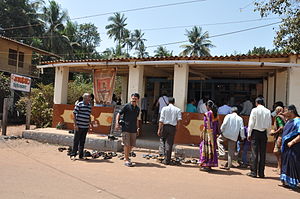Diveagar Kokan | |
|---|---|
Village | |
| Country | |
| State | Maharashtra |
| District | Raigad |
| Population | |
| • Total | 4,069[1] |
| Languages | |
| • Official | Marathi |
| Time zone | UTC+5:30 (IST) |



Diveagar (Dive Agar) is a village located in Shrivardhan Taluka, Raigad district in the Indian state of Maharashtra,[2] approximately 170 kilometers south of Mumbai. The region includes a fishing settlement, a beach, a temple, local businesses engaged in coconut and beetle nut tree farming, and some tourism businesses such as restaurants, cottage rentals and hotels, and six villages (from north to south): Velas, Musalmāndi, Agar Panchaitan, Diveagar, Borli Panchatan, and Karle. A Suvarna Ganesh Mandir with lord Ganesh idol of gold is famous in Diveagar for tourists, the Ganesh idol was stolen on 24.3.2012 by some miscreants. The beach, facing the Arabian Sea, is approximately four kilometres long[3] and undeveloped. At the north end of the beach where a small stream enters the ocean there is the fishing settlement, Velas Agar, and some paddy farming, while at the south end there is a sanctuary for migratory seabirds. Nearby, there is a small fishing village, where vendors sell fresh fish, which goes by name of Bharadkhol.[4] The beach is accessible from the Mumbai-Goa highway via Kolad or Karnala.
The beach contains a number of suru trees (Casuarina), which are common to coastal Maharashtra. The access to the beach has a dense cover of belu trees, which are otherwise uncommon in the area.[5]
References
[edit]- ^ "Populationofindia.co.in".
- ^ Diveāgar (Approved) at GEOnet Names Server, United States National Geospatial-Intelligence Agency
- ^ see GoogleEarth
- ^ "www.konkanyatra.com/diveagar/places.html". Archived from the original on 29 March 2013. Retrieved 4 April 2013.
- ^ "Diveagar Beach". India: Puneri Travellers. 31 October 2014. Archived from the original on 18 February 2020. Retrieved 31 October 2014.
Well, that’s interesting to know that Psilotum nudum are known as whisk ferns. Psilotum nudum is the commoner species of the two. While the P. flaccidum is a rare species and is found in the tropical islands. Both the species are usually epiphytic in habit and grow upon tree ferns. These species may also be terrestrial and grow in humus or in the crevices of the rocks.
View the detailed Guide of Psilotum nudum: Detailed Study Of Psilotum Nudum (Whisk Fern), Classification, Anatomy, Reproduction